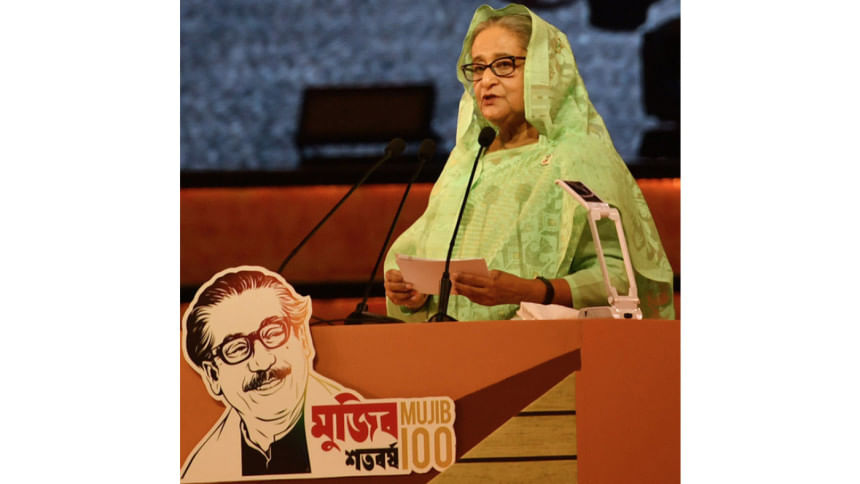We are sufferers of, not contributors to climate change: Hasina

Prime Minister Sheikh Hasina has shared her regional vision of fostering friendship in South Asia to optimise natural resources, alleviate poverty and work together to tackle the challenges of climate change.
"No one can deny that a huge fraction of the population in South Asia is still living below the poverty line. A large number of people is still going to bed every night with a half-stomach or no food. Many are deprived of the minimum necessities of life," she said.
It is possible to alleviate the poverty of the people of South Asia by ensuring optimum utilisation of the natural resources that this region is endowed with, the prime minister said while addressing the twin celebrations of Mujib Borsho and golden jubilee of Bangladesh's independence at the National Parade Ground on the sixth day of the 10-day event today.
Nepalese President Bidya Devi Bhandari spoke at the event as the guest of honour, while President Abdul Hamid as chief guest. Education Minister Dipu Moni delivered the welcome speech, while noted litterateur Selina Hossain presented a keynote on "Banglar Mati Amar Mati" at the event moderated by State Minister for Foreign Affairs Shahriar Alam.
Nepali President congratulated Bangladesh on the occasion and for the socio-economic progress made by the country over the last decades, while also calling for stronger connectivity in air, water and road as well as trade relations for improving the lives of people.
Hasina said Father of the Nation Bangabandhu Sheikh Mujib had always fought for the freedom of the people under exploitation and deprivation. He was always vocal about establishing basic human rights. He wanted the people of independent Bangladesh to be economically self-reliant.
"He was on a mission to ensure basic rights like food, clothing, shelter, medicine, and education for all. It was very unfortunate that the progress of Bangladesh came to a halt after the assassination of Bangabandhu and his family members by the killers on August 15, 1975," she said.
In the last 12 years, tracking through the path shown by Bangabandhu, Bangladesh has achieved successes beyond imagination in all socio-economic indicators and last month received a final recommendation to shift from LDC to developing country status. She congratulated Nepal that has also received the same
However, noting the huge number of people still living in poverty, she said, "We will continue our efforts to transform the region into a poverty-free developed region by maintaining friendly relations with each other."
The PM said South Asia is a natural disaster-prone area. Countries in the basin of the Himalayas are prone to earthquakes, cloud bursts, avalanches, landslides, flash floods, while coastal regions like Bangladesh stand against frequent floods, tidal surges, earthquakes, heavy rains, or droughts.
"Global warming and climate change have made the countries of our subcontinent the most vulnerable. We are the biggest sufferers of the consequence of climate change though we are not contributing to this change. We can temporarily protect ourselves through adaptation, but the adaptation process will fail to provide sustainable protection unless the current trend of climate change is restricted."
The premier said as the current President of the Climate Vulnerable Forum, Bangladesh has been urging world leaders to take immediate steps to tackle climate change. The Dhaka office of the Global Climate Adaptation started working on tackling the effects of climate change in South Asia.
"In this auspicious moment of celebrating the birth centenary of our Father of the Nation Bangabandhu Sheikh Mujibur Rahman and the Golden Jubilee of independence, I call upon the world to make sure of sustainable development."

 For all latest news, follow The Daily Star's Google News channel.
For all latest news, follow The Daily Star's Google News channel. 



Comments